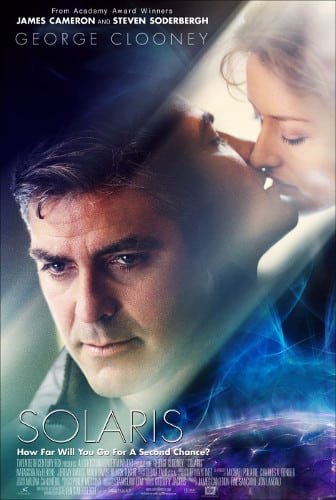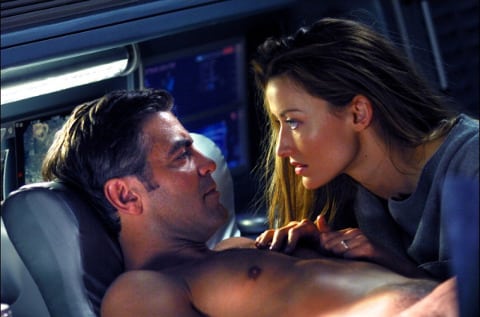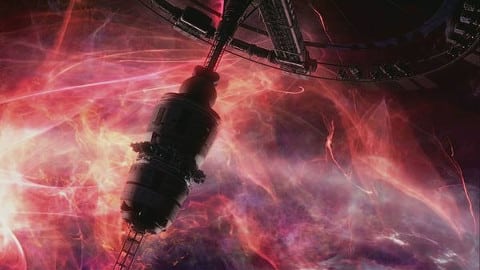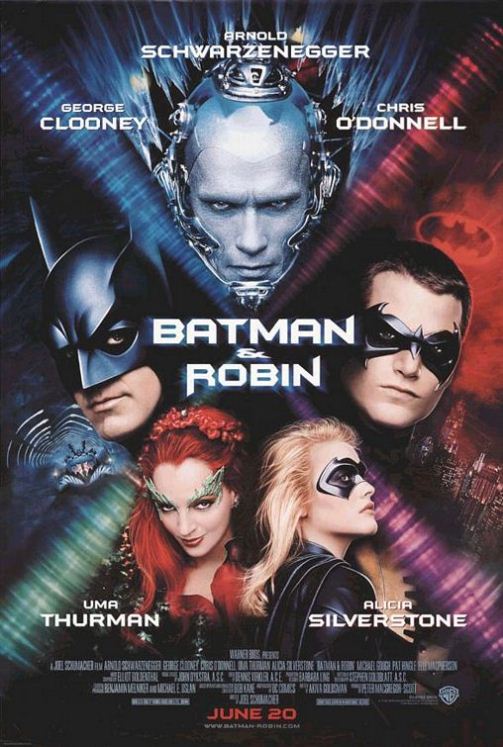Solaris (2002)
Directed by: Steven Soderbergh
Written by: Stanislaw Lem, Steven Soderbergh
Starring: George Clooney, Jeremy Davies, Natascha McElhone, Viola Davis
USA
AVAILABLE ON DVD
RUNNING TIME: 99 min
REVIEWED BY: Dr Lenera, Official HCF Critic
SPOILERS!
Psychologist Chris Kelvin embarks on a journey to a space station orbiting the remote planet Solaris. His friend Dr. Gibarian requested that Kelvin come to the station to help understand an unusual phenomenon but refused to explain more. The mission to study Solaris has been sidetracked and none of the astronauts want to return home. At the station, he finds that that Gibarian has killed himself and most of the crew have either died or disappeared under bizarre circumstances. Both surviving crew member are uncooperative and evasive, Once alone in his quarters, Kelvin dreams about his dead wife Rheya, and awakens shocked and terrified to encounter Rheya apparently alive again beside him in bed….
Though I’ve never seen one that I’ve actually hated, I always seem to have mixed reactions to the films of Steven Soderburgh. If I really like one, than I’m likely to dislike the next. I think he went through a rather ‘meh’ period with Contagion, Haywire and Magic Mike, but Behind The Candelabra and especially Side Effects seemed to me to begin a major artistic revival even though they failed to do the business at the box office. 2002’s Solaris was easily my favourite of his films when it came out, even though it seemed a little cold considering that it had a love story at its core, and I enjoyed it almost as much on the next two or three viewings, but today – well, perhaps watching it only a few hours after the 1972 version, a film which impressed me hugely and even blew me away for some of the time – may have been a mistake as it resulted for me in this American remake’s qualities being greatly diminished. It’s still far better than a lot of remakes, doesn’t actively disrespect the original, looks and feels different enough to it to justify its existence, and remains intelligent, restrained and refuses the Hollywood temptation to emphasis the hardware and add action – but it is a decidedly inferior picture despite the addition of a few interesting details towards the end, albeit details that actually make this version more confusing and perhaps unnecessarily so. The Russian picture isn’t actually that confusing- it just requires total immersion and a viewer willing to think and to be patient.
For a while, it was James Cameron who was looking to remake Solaris, and he spent five years securing the rights from author Stanislow Lem and Mosfilm who owned the Andrei Tarkovsky film. However, because of his many commitments, Cameron was unable to take on writing and directing duties and he recommended Soderburgh for the jobs. I recall seeing Soderburgh mention on the DVD extras that he set out to get back to the novel and not think of the previous film too much, but either something went wrong or he was just telling a great big fat lie as his adaptation is even further from the book, Lem hating how he simplified his story even further. Soderbergh originally intended Daniel Day-Lewis to play the role of Chris Kelvin, but Day-Lewis was talking too long with Gangs of New York at the time, and anyway, since since George Clooney was Soderbergh’s producing partner, Soderbergh was obligated to send him a copy of the Solaris script. The film was shot in Los Angeles and on the same Warner Bros. stages where Ocean’s Eleven was shot on. As with a few of his other movies, Soderbergh also acted as cinematographer and editor, both of which were credited under pseudonyms. A few weeks before release, the MPAA harshly gave the film a ‘R’ rating due to two shots of Clooney’s bum. An appeal by Soderburgh and other complaints by filmmakers against the MPAA caused the rating to be lowered to a ‘PG-13’. This didn’t help the box office, which was very low despite many good reviews, Solaris being Clooney’s biggest flop to that date.
After watching the lengthy takes of Tarkovsky’s film, it took me a few minutes for me to adjust to the tighter editing of Soderburgh’s, especially the opening minutes which just show us fragments of scenes – Chris Kelvin in a room hearing Rheya’s voice in his head, Chris in a street, Chris on a train, and Chris at a grief group meeting – though at least Solaris lacks most of the usual Soberburgh directorial tricks which can be fun but can also annoy in the wrong film. There’s no father character at all in this version which immediately creates a hole, though the even greater concentration on the love story was probably thought wise for commercial reasons. Chris gets to the space station before very little screen time has past, though after this the film really is very similar to its predecessor for ten minutes or so in how it presents the crew and introduces the concept of the “guests”, here called “visitors”, though this one disappointingly doesn’t try to be scary. The design of this space station is far conventional, and also everything just looks too slick and shiny for a craft that’s been up in space for ages. Something more like the spaceship from Alien may have worked much better. The planet is disappointing too – somehow a constantly changing ocean under some fog is more interesting than a typical looking moon with what looks like electrical currents happening all over it. On the other hand the CGI is some of the best of its kind to its date, the film perhaps presenting the first really convincing-looking computer generated spacecraft.
Soderburgh soon commences his other greatest deviation from Tarkovsky. Whereas as before we learn very little about the husband/wife relationship except how it horribly ended, here we see flashbacks that how they met and follow them through stages in a series of short, sometimes jaggedly edited together sequences, not really montages but still more snippets of scenes rather than whole scenes. This is quite nice to see and their first encounter is rather sweet, the two seeing each other on a bus and him following her into a party, but the rather distant approach along with the endlessly dark cinematography doesn’t result in much warmth and we don’t end up caring as much as we should when Chris is visited by one, than another duplicate of his dead wife, even when Soderburgh adds another reason for the real Rheya killing herself. There’s too much obvious sign posting, like when Chris quotes a Dylan Thomas poem which recurs later and you just know is going to feature in the end [in fact it almost predicts the end], though it’s interesting that some of the later flashbacks appear to be from the duplicate Rheya’s point of view as she picks up on more and more of the real Rheya’s life as remembered by Chris. And this duplicate is quite different from the real person, whose inability to hold a job, mood swings, reluctance to have a child, and eventual suicide suggest bipolar disorder, Chris remembering a more idealised version of Rheya so naturally the duplicated Rheya is mostly just comprised of different elements. This means that the 1972 film’s idea of us never really knowing those we love, people who are more the sum of our own selfish ideals, is slightly tweaked so it poses the question of whether we are the sum of not just how other people remember us but how we remember ourselves, or whether there’s more that defines our reality.
Soderburgh has the intelligence to suggest, rather than state, a rather goosebump-inducing twist concerning the identity of the strange little boy occasionally seen in the ship, but a full-on revelation that one of the characters has been a “visitor” all along and killed the real person ages ago somewhat messes with the general idea of what or who Solaris is – some kind of sentient being which conjures up phantoms from people’s dreams or subconscious – and the last few scenes just try to pointlessly complicate stuff as it gives us several moments which contradict the one immediately before it, something which Tarkovsky just didn’t feel the need to, and he was right. It’s even suggested to us that the real Chris dies as the ship chrashes into Solaris and his duplicate has somehow gone to live on Earth, which does conjure up ideas of a possible Invasion Of The Body Snatchers-style sequel though doesn’t really belong. At least you’re still being asked to think, and the whole film has an almost trance-like feel what with the style of shooting, the pacing, and the fantastic scoring of Cliff Martinez [one of the most underrated of modern movie composers] which goes from genuinely disturbing György Ligeti-influenced dissonance to gorgeous semi-techno with steel drums.
I’ll admit right here that I’ve never really ‘got’ George Clooney. While he can give a fine performance when he wants to as in The Descendants, most of the time he just seems to play a smug caricature of himself and rely wholly on his star charisma. Thankfully in Solaris he actually delves deep into the situations and emotions of his character and never fails to convince. Natasha McElhone is less ethereal than her Russian counterpart but this is kind of appropriate as we get to know her character[s] more. Jeremy Davies is so hugely entertaining to watch as the unhinged astronaut Snow though that he steals too many scenes. There is a lot in this Solaris that does work, and a lot to admire. It’s a project that could have ended up as a total atrocity, so Soderburgh and his cast and crew deserves a lot of credit for turning out a film as good as they did, and I don’t think that it would have worked at all as a James Cameron picture [you can just imagine it], though Soderburgh does tend to make rather cold pictures so I think some other filmmakers may have done a better job filming this particular story. I’m still very glad that it exists. Its star does greatly diminish though when having just seen its magnificent predecessor for the first time, and it then can’t help coming across as a rather pale shadow of it.
Rating: 
















Be the first to comment